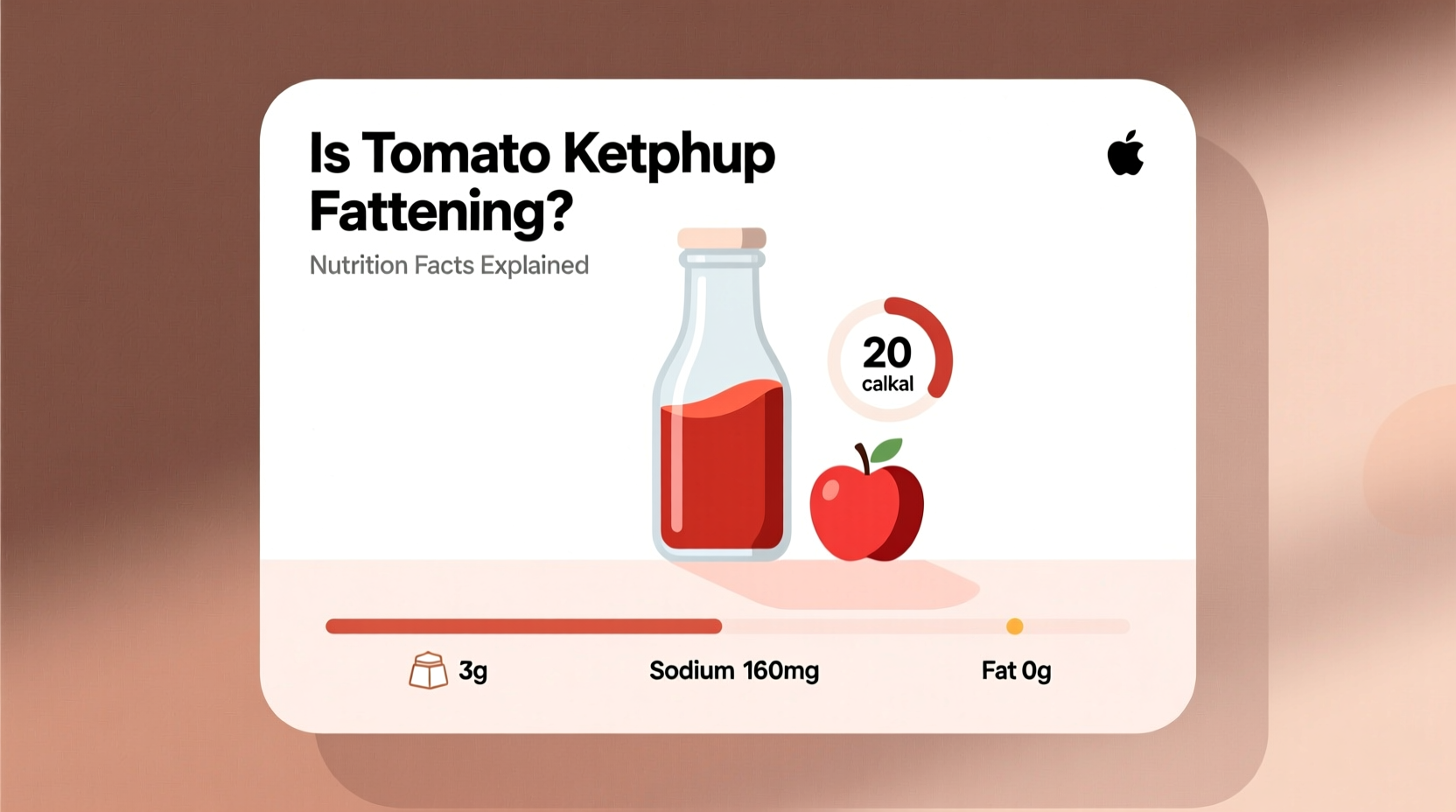Many people worry about whether their favorite condiments are sabotaging their health goals. If you've ever wondered is tomato ketchup fattening, you're not alone. Let's cut through the confusion with science-based facts that will help you make informed choices about this kitchen staple.
Understanding Ketchup's Nutritional Profile
Before determining if tomato ketchup contributes to weight gain, we need to examine what's actually in this popular condiment. Traditional tomato ketchup consists primarily of:
- Tomato concentrate (providing lycopene and other antioxidants)
- Vinegar (for preservation and tang)
- Sugar (typically high-fructose corn syrup or cane sugar)
- Spices and flavorings (onion powder, garlic powder, etc.)
- Thickening agents
The sugar content often raises concerns, but context matters. According to USDA FoodData Central, a standard 1-tablespoon (17g) serving of ketchup contains:
| Nutrient | Amount per 1 Tbsp (17g) | % Daily Value* |
|---|---|---|
| Calories | 15-20 | <1% |
| Total Sugar | 3.7-4g | 8% |
| Carbohydrates | 4g | 1% |
| Sodium | 150-170mg | 7% |
| Lycopene | 2.5-3mg | N/A |
*Based on a 2,000 calorie diet. Daily values may vary based on individual needs.
Calorie Context: How Ketchup Fits Into Your Daily Intake
When evaluating whether ketchup causes weight gain, the critical factor is portion size. Most people use 1-2 tablespoons of ketchup per serving. Even at two tablespoons, you're looking at just 30-40 calories—less than 2% of a typical 2,000-calorie daily intake.
Registered dietitians consistently emphasize that no single food causes weight gain—it's the overall calorie balance that matters. The American Heart Association notes that added sugars should comprise no more than 6% of daily calories for women (about 25g) and 9% for men (about 36g). A single tablespoon of ketchup contributes approximately 10% of the daily added sugar limit for women.
Sugar Content: Separating Fact From Fear
The sugar in ketchup often triggers concern, but let's put it in perspective. Compared to other common condiments:
| Condiment | Sugar per Tablespoon | Calories per Tablespoon |
|---|---|---|
| Tomato Ketchup | 4g | 15-20 |
| Barbecue Sauce | 7g | 45-50 |
| Honey Mustard | 5g | 40-45 |
| Teriyaki Sauce | 3g | 20-25 |
| Mayonnaise | 0g | 90-100 |
As you can see, ketchup actually contains less sugar than many popular alternatives. The 2020-2025 Dietary Guidelines for Americans recommend limiting added sugars to less than 10% of daily calories, and ketchup fits within this framework when used appropriately.
Practical Guidelines for Healthy Ketchup Consumption
Based on research from the USDA Food and Nutrition Information Center, here's how to enjoy ketchup without worrying about it affecting your weight:
- Measure your portions: Use a tablespoon to control servings rather than free-pouring
- Pair with nutrient-dense foods: Ketchup on a grilled chicken breast or roasted vegetables adds flavor without excessive calories
- Check labels: Some brands offer reduced-sugar or organic options with slightly different nutritional profiles
- Consider your overall diet: If you're already consuming many high-sugar foods, you might want to moderate ketchup use
Special Considerations for Different Dietary Needs
While is tomato ketchup fattening generally isn't a concern for most people, certain groups should be more mindful:
- People managing diabetes: The sugar content, while modest, should be accounted for in carbohydrate counting
- Those following strict low-sodium diets: Ketchup contains about 150mg sodium per tablespoon
- Individuals on calorie-restricted diets: Every calorie counts, so measure portions carefully
For those concerned about sugar, some brands offer no sugar added versions that use alternative sweeteners. However, these often trade sugar for artificial sweeteners, which may not be preferable for everyone.

Debunking Common Ketchup Myths
Let's address some widespread misconceptions about ketchup and weight management:
- Myth: Ketchup is high in high-fructose corn syrup, which causes weight gain
Fact: While some brands use HFCS, the amount per serving is small. Research from the American Heart Association shows that moderate consumption of added sugars doesn't uniquely cause weight gain compared to other calorie sources - Myth: Ketchup has no nutritional value
Fact: Tomato ketchup provides lycopene, a powerful antioxidant. Studies published in Nutrition Journal show that lycopene absorption actually increases when tomatoes are cooked and processed, as in ketchup production
When Ketchup Might Contribute to Weight Gain
The only scenario where ketchup could be fattening is when consumed in excessive quantities. If you're using 5-6 tablespoons per serving (300+ calories, 25g sugar), it could contribute to weight gain over time. However, this is far beyond typical usage patterns.
Research from the National Institutes of Health indicates that condiment overuse often accompanies less healthy eating patterns overall. The ketchup itself isn't the problem—it's the context of what you're eating it with and your overall dietary pattern.
Smart Swaps and Alternatives
If you're watching your sugar intake but still want flavor, consider these alternatives:
- Salsa: Typically lower in sugar (1g per 2 tbsp) and higher in vegetables
- Mustard: Virtually sugar-free options available with strong flavor impact
- Hot sauce: Most varieties contain negligible calories and sugar
- DIY ketchup: Make your own with tomato paste, vinegar, and minimal sweetener
Remember that switching to alternatives only matters if you're actually consuming enough ketchup to make a difference in your overall diet. For most people using normal portions, the difference is negligible.
Final Verdict: Should You Worry About Ketchup and Weight Gain?
The evidence is clear: tomato ketchup is not fattening when consumed in typical amounts. With just 15-20 calories and 4g of sugar per tablespoon, it's unlikely to impact your weight when used as intended.
As with all foods, moderation is key. If you're using ketchup sensibly as a condiment rather than consuming it by the cup, it can absolutely fit into a healthy, balanced diet without contributing to weight gain. Focus on your overall dietary pattern rather than fixating on single ingredients.











 浙公网安备
33010002000092号
浙公网安备
33010002000092号 浙B2-20120091-4
浙B2-20120091-4